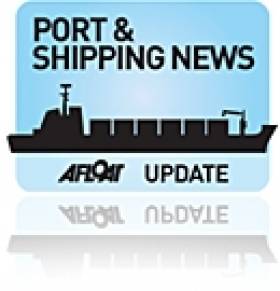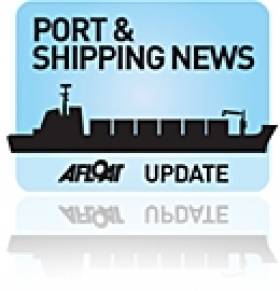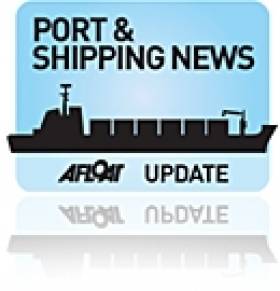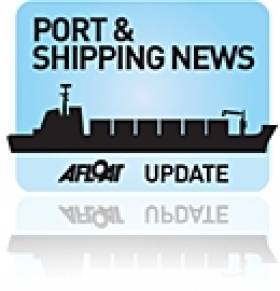Displaying items by tag: Arklow Bridge
First Quarter Boost for Drogheda Port
#PORTS & SHIPPING – After the first three months of 2012 Drogheda Port Company reported figures well above average in the port sector with throughput growth posting an impressive 59% increase on the corresponding period of last year.
Over 228,000 tonnes of cargo was handled by the Co. Louth port and for the first time the balance of trade in the port equalised with 50% of the volume represented by imports and 50% of the volume represented by exports.
The volume growth at the port is very much export led with a number of indigenous industries focusing on the European and UK markets as outlets for their products.
As previously reported on Afloat.ie a new tonnage record was set in January when the Arklow Bridge (2011/4,723grt) carrying 7,175 tonnes of maize representing the largest ever single cargo handled in the port.
Mr Paul Fleming, Drogheda Port Chief Executive said "Drogheda Port continues to provide a strategic import/export location for our customers with a service more flexible and cost competitive than other larger ports. This is helping us to win new contracts and grow our business".
He added: "The ports performance demonstrates the economy is rebalancing towards exports at a time when our economic recovery is very much dependent on being driven by our exporting firms."
The outlook for the Irish port sector for 2012 looks likely to be testing for the domestic port and shipping sectors and according to the port they project to continue above average volume increases for the year.
In May the port can look forward to hosting its first cruise call by the Clipper Adventurer (1975/4,367grt) as previously reported. The vessel will be undertaking its inaugural circumnavigation of the island of Ireland visiting a number of destinations including Drogheda and the Boyne Valley.
Arklow Vessel Sets Record Cargo for Drogheda Port
#PORTS & SHIPPING – Drogheda Port set a record tonnage cargo with the arrival of Arklow Bridge (2011/4,723grt) last week. The vessel operated by Arklow Shipping N.V. as previously reported on Afloat.ie had carried 7,125 tonnes of maize, the largest ever single cargo handled in the Co. Louth port, writes Jehan Ashmore.
Arklow Bridge is the second 'B' class vessel that was built last year and the Dutch-flagged vessel loaded the cargo of maize in the Polish city of Gdynia for Comex McKinnon. The company is a leading player in the importation and trading of feedstuffs for the animal feed sector in Ireland.
Stevedoring services were handled by Fast Terminals, a new company which is a joint venture between Drogheda Port Company and Fast Shipping of Antwerp. The company became operational last Septemberand increases the number of stevedoring operations in the port to four.
Drogheda Port is developing its agri-sector business so to transport feedstuffs for the animal feed sector in Ireland. The agri-food sector is worth €7.8bn and is proving resilient, despite the downturn and growth from this indigenous sector will be vital to the country's overall economic recovery.
According to Drogheda Port Company, planning permission was recently received for the development of a 5,400sq m bulk storage facility at the Tom Roes Point Terminal. The downriver facility is situated closer to the open sea compared to the towns quays on the banks of the Boyne.
Mr Paul Fleming, Drogheda Port Chief Executive said "Drogheda Port continues to provide a strategic import and export location for our customers with a service which is more flexible and cost competitive than other larger ports".
He added: "This is helping us to win new contracts and grow our business in addition to providing a platform to Ireland's importers and exporters to reach their markets more cost competitively."
Mr Simon Mulvany, Director of Fast Terminals said "Fast Terminals has identified the competitive opportunities that Drogheda Port can offer our company. Despite the current economic downturn we intend to invest in the port and develop our facilities to cater for further growth in the future."
Arklow's Asian Newbuilds
Arklow Shipping (ASL) has turned to the Sekwang Shipbuilding, South Korea for three general cargoships according to www.tradewinds.no
An order has been placed for three 14,200-dwt general cargoships at the yard for delivery from late 2012 to early 2013. The deal includes an option for an extra vessel. To read more click here.
Separate to the Asian newbuild programme is the 4,700 gross tonnes Arklow Bridge (click photo) the latest vessel completed for Arklow Shipping B.V. from the Dutch shipyard of Bodewes B.V.
The Co.Wicklow based company was established in 1966 and has a current fleet of over 40 vessels under the Irish, Dutch and Antiguan flags.
The Future’s Green, Bright and Orange
This month ASN are due delivery of the 4,700 gross tonnes Arklow Bridge, the second 'B' class newbuild was also built by the Dutch company of Bodewes Shipyards B.V. She is the fifth vessel to carry this name since Arklow Shipping was founded in 1966.
The Arklow Bridge is registered in St. John's the capital of the Caribbean island of Antigua where she will be flagged. Antigua became an associated state of the Commonwealth until it was disassociated from Britain 30 years ago.
Her sister Arklow Brook entered service this year and is designed with two holds with a total (grain and bale) capacity of 9473.1m3 or an equivalent of 33,4524 ft3.
For cargo-separation the holds can be sub-divided by a portable bulkhead in up to 8 positions. In addition to carrying agricultural-based cargoes, the 116m (OA) overall long vessel can handle 177 (TEU) containers in the hold and another 88 can be stowed on top of the hold's hatch covers. Both the holds are fitted with dehumidifier's.
The power-plant is derived from a MaK 6M32C 2999kW main engine with a Renk gearbox and Berg controllable pitch propeller that provides around 12 knots.
With the entry of Arklow Bridge, the combined fleet is over 40 ships that trade in the north-west of Europe and the Mediterranean. For further vessel statistics of the sisters click here and for a photo of the new vessel click this link.
Asides the Rotterdam based operation of ASN, the Irish side of the company is the largest indigenous owned shipping company in terms of Irish-flagged and registered tonnage. Arklow is not only the headquarter's of ASL but the homeport is also where the vessels are registered.
- Dublin Port
- Co. Wicklow
- Arklow Shipping
- Newbuilds
- The Netherlands
- Arklow Shipping Ltd
- Ports and Shipping News
- Caribbean
- DryDock
- Antigua
- British
- Dublin Port news
- Arklow Bridge
- Arklow Brook
- ASN
- Arklow Shipping B.V.
- Irishflagged
- Irishregistered
- Arklow Future
- Bodewes Shipyards
- Dutchflagged
- Antiguaflagged
- Mak
- The Commonwealth
- River Avoca

































































